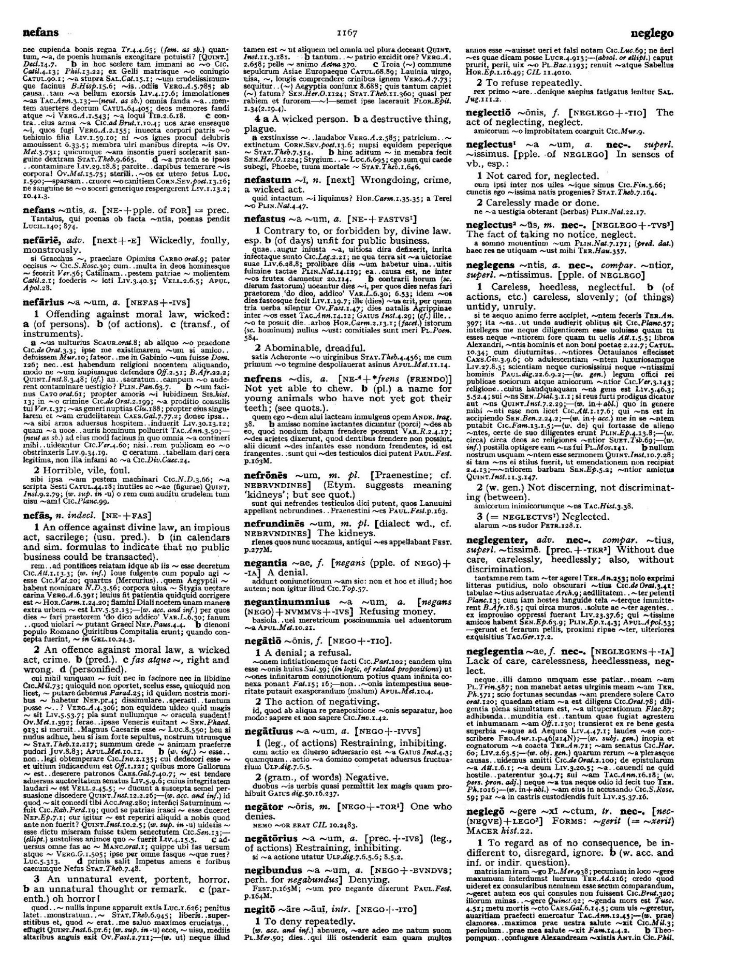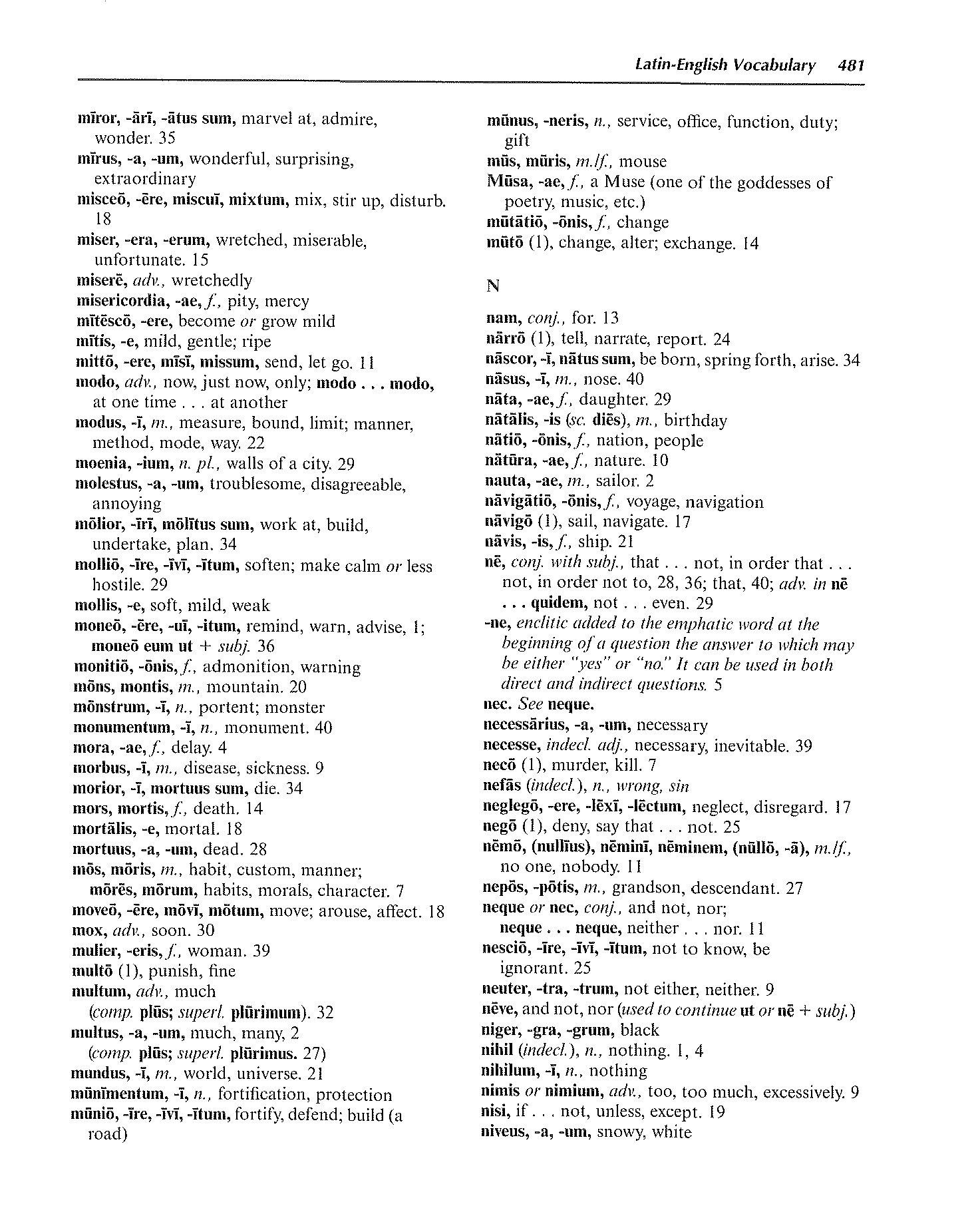
page_listing.tpl
page_subListingDetails.tpl
sub_listingDetails_style1.tpl
sub_listingDetails.title.tpl
nefās wrong
nefās is a Latin Noun that primarily means wrong.
Definitions for nefās
Wheelock's Latin
Noun
- 1
wrong, sin
Oxford Latin Dictionary
Noun
- 1
An offence against divine law, an impious act, sacrilege; (usu. pred.). (b) (in calendars and sim. formulas to indicate that no public business could be transacted).
- 2
An offence against moral law, a wicked act, crime. (b) (pred.). (c) fas atque~, right and wrong. (d) (personified).
- 3
An unnatural event, portent, horror. (b) an unnatural thought or remark. (c) (parenth.) oh horror!
Sentences with nefās
Latin to English
Tu ne quaesieris —scire nefas — quem mihi, quem tibi finem di dederint, Leuconoe, . . . Dum loquimur, fugerit invida aetas: carpe diem, quam minimum credula postero. (Horace, Odes 1.11-2 and 7-8)Compare Don't inquire — it's wrong to know—what length of life the gods have granted to you and to me, Leuconoe, . . . While we are talking, envious time has fled; seize the day, putting as little trust as possible in the future.
Audax omnia perpeti gens humana ruit per vetitum nefas.Compare In its boldness to bear and to dare all things, the race of man rushes headlong into sin, despite of law.
Religentem esse oportet; religiosum nefas.Compare It is reasonable to be religious, abominable to be supertitious. [Anonymous poet]
Summum crede nefas animam praeferre pudori, et propter vitam vivendi perdere causas.Compare Think it the greatest impiety to prefer life to disgrace, and for the sake of life to lose the reason for living.
Declension table for nefās
Cactus2000
| Singular | Plural |
Data sources
Notes
- Definitions
- Frederick M. Wheelock, Wheelock's Latin, 6th ed., rev. Richard A. LaFleur (New York, NY: HarperCollins Publishers, 2005): 481.
- P. G. W. Glare, Oxford Latin Dictionary, Vols. 1-8 (Oxford: Clarendon Press, 1982): 1167.
- Word frequencies
- Christopher Francese, "Latin Core Vocabulary," Dickinson College Commentaries, last modified 2014, http://dcc.dickinson.edu.
- Paul B. Diederich, The Frequency of Latin Words and Their Endings, PhD diss., (Columbia University, 1939).
Bibliography
Allen, Joseph H. Allen and Greenough's New Latin Grammar for Schools and Colleges: Founded on Comparative Grammar. Edited by James B. Greenough, George L. Kittredge, Albert A. Howard, and Benjamin L. D'Ooge. Boston, MA: Ginn & Company, 1903.
Crystal, David. A Dictionary of Linguistics and Phonetics. 6th ed. Oxford, UK: Blackwell Publishing, 2008.
Delatte, Louis, Suzanne Govaerts, Joseph Denooz, and Etienne Evrard. Dictionnaire fréquentiel et index inverse de la langue latine [Frequency Dictionary and Inverse Index of the Latin Language]. Liège, Belgium: Laboratoire d'analyse statistique des langues anciennes de l'Université de Liège (L.A.S.L.A.), 1981.
Diederich, Paul B. The Frequency of Latin Words and Their Endings. PhD diss., Columbia University, 1939.
Francese, Christopher. "Latin Core Vocabulary." Dickinson College Commentaries. Last modified 2014. http://dcc.dickinson.edu/latin-vocabulary-list.
Gildersleeve, Basil L., and Gonzales Lodge. Gildersleeve's Latin Grammar: Third Edition, Revised, and Enlarged. 3rd ed. London, England: Macmillan and Co., 1903.
Glare, Peter G.W. Oxford Latin Dictionary. Vols. 1-8. Oxford, England: Clarendon Press, 1982.
Krüger, Bernd. "Latin Conjugation Tables." Cactus2000. Accessed May 5, 2023. https://latin.cactus2000.de/index.en.php.
Pierson, Nick. "Sound of Text." Accessed October 26, 2019. https://soundoftext.com.
Wheelock, Frederick M. Wheelock's Latin. 6th ed. Revised by Richard A. LaFleur. New York, NY: HarperCollins Publishers, 2005.
Wiktionary Contributors. "Victionarium." Wikimedia Foundation, Inc. Updated March 18, 2019. https://la.wiktionary.org/wiki/Victionarium:Pagina_prima.
Citation
Chicago (17th ed.)
Allo Contributors. "nefās (n.) - Latin Word Definition." Allo Latin Dictionary. Last modified . Accessed February 20, 2026. http://ancientlanguages.org/latin/dictionary/nefas.
Entry created on . Last updated on .







